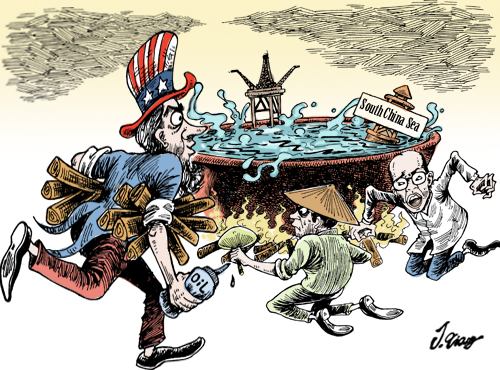US group to urge China-Japan talks
 0 Comment(s)
0 Comment(s) Print
Print E-mail China.org.cn, October 22, 2012
E-mail China.org.cn, October 22, 2012
A group of former U.S. national security officials has embarked on a semi-official visit to Japan and China respectively with the effort to defuse tensions between the two countries over the Diaoyu Islands.
Headed by the?former US deputy secretary of state Richard L. Armitage, the group started the trip on Saturday and will meet Japanese Prime Minister Yoshihiko Noda on Monday and Chinese senior officials on Tuesday, according to?Japan's Jiji Press News Agency.
|
|
|
Chinese hotpot [By Jia Qiang/China.org.cn] |
Analysts said the visit may help ease the tensions that have arisen between China and Japan and make it easier for the countries to enter dialogues, adding that the US is expected to "do what it says it would do".
US Secretary of State Hillary Clinton has endorsed the Armitage visit and given it quasi-official status, the New York Times said.
The newspaper quoted a member of the group as saying there are no plans to put a specific proposal before the Chinese and Japanese, but that the group is prepared to discuss a variety of possibilities.
Japan's Kyodo News Agency said the visit seeks to avoid long-term confrontation between China and Japan, and the US is expected to take steps to warm the countries' relations.
Tensions have soared since the Japanese government completed an illegal "purchase" of the Diaoyu Islands in mid-September.
The US has declined to take a position in the dispute but has said the Diaoyu Islands fall under the US-Japan security treaty, a contention that has drawn objections from China.
The US stance on the Diaoyu Islands is related to its "pivot to Asia" strategy and its aim, as China's influence becomes greater, to strike a new balance of regional power in East Asia, said Shen Dingli, director of the Center for American Studies at Fudan University in Shanghai.
But the continued tensions, especially with the US posing a greater military threat, will only damage the foundation the US stands on in trying to maintain order in the Asia-Pacific region, Shen said recently.
The US and Japan have planned a drill to simulate retaking of a remote island from foreign forces. That action will form part of broader Japan-US maneuvers that are to start in early November.
AFP reported on Saturday, though, that the governments are likely to cancel the drill out of a fear that it will provoke more anger in China. China dispatched naval vessels, aircraft and helicopters to the East China Sea on Friday, sending them there for a one-day exercise.
Despite its call for a peaceful resolution to the islands row, Japan spared no efforts during Japanese Foreign Minister Koichiro Gemba's visits to France, Britain and Germany last week to argue in favor of its claim to the islands. But those on the trips only receive a cold response when they brought up the dispute, reported Japanese newspapeMainichi Shimbun, saying that none of the three countries visited has taken a position in the matter. When asked whether support was obtained during the trip, Gemba did not respond directly, only saying that each of the three parties is in a different situation and no details about the matter can be disclosed, Kyodo reported.
Kyodo said Gemba had high expectations for the tour but found it hard to obtain support in the countries he visited.
Meanwhile, Tokyo has started to turn to Moscow. During a meeting between Japan and Russia in Tokyo on Friday, the Japanese asked that Russia show understanding toward Japan's stance on the Diaoyu Islands.
Japanese newspaper Sankei Shimbun said China's presence in the ocean is expanding and Japan and Russia have a "shared a belief about containing China".
In a separate development, 64 Chinese crew members aboard a cargo ship were rescued after their boat caught fire on Saturday evening near waters off Okinawa, an official from the Chinese embassy in Japan told Xinhua on Sunday.
Smoke was at first spotted at the stern of the cargo ship on Saturday night. Responding to the emergency, the Japanese coast guard dispatched aircraft and patrol vessels on Saturday night.
The Chinese crew members were rescued early on Sunday morning, Kyodo News reported. Three of them were slightly injured. Uichiro Niwa, Japanese ambassador to China, warned on Saturday that the tensions could set the countries' diplomatic relations back before their normalization, which occurred 40 years ago.






